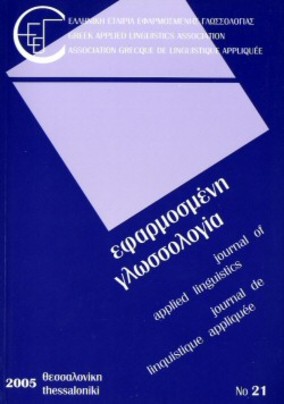Le bilinguisme en petite enfance
Part of : Εφαρμοσμένη γλωσσολογία ; No.10, 1994, pages 29-32
Issue:
Pages:
29-32
Parallel Title:
Research on the dynamics of biculturalism in early childhood
Author:
Abstract:
The principal hypothesis of this study was that bi-/multi-culturalism and bi-/multi-linguialism are not sources of confusion; this is true, however, on condition that the family and the pre-school environment are favourable and collaborate in order to create an atmosphere of assurance and self-confidence to bicultural-bilingual children. This research also relates to bilingual kindergarten children. A number of taperecordings were made in different contexts and in differently situated action in several french-hellenic kindergartens in Athens. The study demonstrated that the identity processes of the french/hellenic children are in close contact with the type of schooling of these children (i.e. monolingual schools, either Greek or French, or bilingual, French/hellenic). It was also found that there is a significant difference as to the degree of bilingualism, among children that go to a bilingual kindergarten rather than to a monolingual one. The former helps the child considerably to obtain or to maintain a high degree of bilingualism. It was finally observed that the more favourable the family environment towards bilingualism, the higher the degree of bilingualism and vice-versa. The most appropriate educational approach for these children could be intercultural psychopedagogy, which contributes enormously to unbiased communicaion between children of different linguistic and cultural backgrounds.
Subject (LC):
Notes:
Περιέχει βιβλιογραφία




